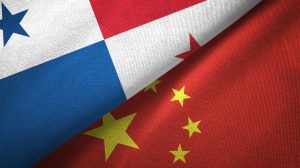In 2017, six months after formalizing diplomatic relations with China, then-Panamanian President Juan Carlos Varela said in Beijing that his country wanted to be the “commercial arm” for China in Latin America. This declaration served to justify Panama’s new partnership with the authoritarian People’s Republic after severing ties with democratic Taiwan.
Six years later, the bilateral journey, full of chiaroscuro, shows the gap between good intentions and actions carried out. China holds a predominant position in the current relationship, while Panama’s benefit is tangential. The relationship has not contributed to the country’s development.
Beijing has achieved several of its strategic goals in Panama. It diplomatically isolated Taiwan and defended its “one China” policy, while strengthening its position in the Colón Free Zone (CFZ), which has become a commercial hub for re-exports and the regional headquarters of 18 Chinese companies. China also secured Panamanian copper and made progress in the construction of infrastructure projects, such as the fourth bridge over the interoceanic canal.
On the Panamanian side, although it has accumulated almost $1 billion stock from Chinese direct investment, this has not focused on sectors that generate productive chains. And in trade, between 2019 and 2023 Panamanian exports focused exclusively on copper, which accounted for more than 95 percent of total shipments.
The definitive suspension of copper mining in the country’s main deposit will considerably alter the trade balance, since in 2023 the mine supplied China with $1.55 billion worth of the metal. Beyond this “monoculture,” sales of other products barely exceeded $61 million.
Providing natural resources is not necessarily a bad business, but it does not generate wealth in the long term and condemns the country to economic “primarization.” At the same time, Panama is importing Chinese products that incorporate significant added value, such as cell phones, vehicles, and components.
Panamanian governments failed by not proposing a strategy to encourage the diversification of agricultural and livestock products. Let us not forget: One of the reasons for China’s presence in Latin America is to guarantee its food security. Such a meager volume of exports can also be explained by the non-tariff barriers that Beijing is so fond of. Only six phytosanitary licenses for food were granted since 2018.
Although there is no official explanation for these delays, it escapes no one that it could be a form of pressure from China to obtain other concessions. Therefore, with the numbers in hand, Panama’s pretense of becoming the Chinese “commercial arm” in Latin America has not only not worked, but has not even served to get Beijing to open its market to Panamanian products.
After the establishment of diplomatic relations, the Varela administration signed 47 agreements with Beijing, the majority of them for the promotion and protection of investments, laying the foundations for a political link favorable to Beijing. As a result of this closeness, China undertook several infrastructure projects and there were five rounds of negotiations for a free trade agreement (FTA).
This relationship generated unease in the United States. Not only did China not adhere to the “Protocol to the Treaty on Permanent Neutrality and the Operation of the Panama Canal,” signed by more than 40 countries, but also Panama is for the U.S. a strategic enclave as well as a geopolitical ally. Since the “Varela model” was uncomfortable for Washington, his successor as president, Laurentino Cortizo, sought a balance.
Cortizo did not hinder the participation of Chinese companies in the CFZ, which guarantees income from the use of the interoceanic canal, nor did he limit copper exports. He even tried to encourage such exports with a law to renew the concession. However, unlike his predecessor, he paralyzed the FTA talks, stopped the construction of the Panama-David train, and did not object to the Panama Maritime Authority’s termination of the contract for a Chinese container terminal in Colón.
Cortizo bet on a scheme of triangular relations between Panama, China, and the United States, trying to take advantage of the geographical location and logistical value of his country to obtain greater benefits. However, a cooling of ties with China was inevitable, including the delay in the approval of new phytosanitary licenses.
The eternal debate on China remains: forge ahead or tread with caution? After the May 5 presidential elections, the next Panamanian president will have to address this dilemma in a context of geopolitical competition between China and the United States. The “Varela model” did not guarantee the development of the country’s productive capacities and strained the relationship with the U.S. And, despite the political honeymoon, the benefits for Panama were minimal.
The new administration must bet on a policy that maximizes the benefits both with China and the U.S., taking advantage of Panama’s strategic location. At the same time, it must create a framework of trust with its partners, so that Chinese activity is not perceived as a threat. Panama was the first regional country to join the Belt and Road Initiative, but this does not imply that it should sacrifice its democratic commitments.
In addition, the next administration must prioritize a long-term strategy with China, the diversification of the export basket, and the creation of conditions for Chinese investment in sectors others than finance and logistics. The candidates agree in wanting a cordial relationship with Beijing, but it is surprising that none of them has presented their strategy. Escaping from the current dynamics of getting closer or distancing – as the case may be – from China or the U.S., and establishing a stable position that will bring long term benefits to Panama, should be a primary matter of state.
This article was originally published in Spanish here.
































